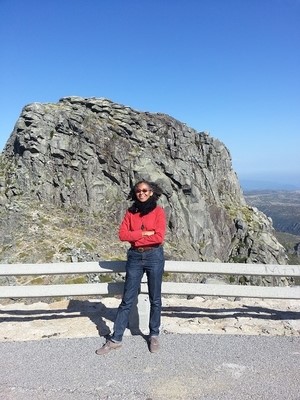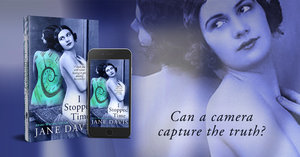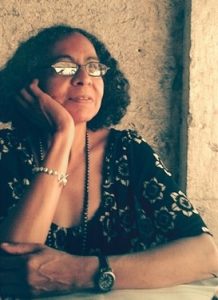Today, I’m delighted to welcome Cynthia Adina Kirkwood to Virtual Book Club, my interview series which gives authors the opportunity to pitch their novels to your book club.
Cynthia, born and raised in New York City, often acted as cultural translator for her parents, who had met there after emigrating from Belize, formerly British Honduras. Today, Cynthia lives in the Portuguese countryside, where her 15-year-old son now does the same for her.
Five years ago, she left a sedentary life in Cornwall, England, for a farming one. She has forty-four olive trees, two hundred and fifty grapevines, and countless fruit trees on four acres of land.
She keeps busy.
Angelica Morgan, her main character in Turn On, Tune Out, also leads a busy life – but on the other side of the world.
Angelica, a composer from England, turns outlaw in Los Angeles.
She flouts a computer law that cripples creativity. In L.A., she finds an audience, love, and a passion to stop the insidious law from taking hold in Britain. In the near future of California, artists, who steal time off-line, are considered suspect, criminal and dangerous.
Angelica’s neighbor and friend, Rosetta, an outspoken painter, cautions the musician about the law that requires four hours of daily screen-watching. However, Angelica dismisses the warning. . .
Q: Turn On, Tune Out was selected as a finalist in the 2017 Wishing Shelf Book Awards. But what makes it a good book club selection?
For book club members, Turn On, Tune Out can raise many issues such as computer addiction, the life of an artist, government control, musical tastes, and dating married men who are separated from their wives. These topics and others make Turn On, Tune Out an appealing choice.
Selfishly, for me, I appreciate the insight that readers share with me after reading Turn On, Tune Out. I don’t always know what I’m saying until a reader tells me what he or she gleans from my writing.
Q: Twenty words on why your book should be a reader’s next read…
If you find your life bombarded by information and noise, read about this musician’s challenge to quiet hers.

Click here to look inside or buy. (Ebook available on Kindle Unlimited)
‘This is more that just a novel, it’s a wake-up call!’
‘A passionately-felt tale with a timeless message.’
‘In what is billed as a futuristic cautionary tale about an authoritarian, computer driven society, is also a meditative eulogy to the artist, and her struggle to find truth and self-expression, in the face of mind-numbing conformity.’
Q: At what point in writing the book did you come up with its title?
After I finished Turn On, Tune Out, I came up with the title.
“Turn on, tune in, drop out,” was a 1960s counterculture phrase popularised by Timothy Leary. Thirty years later, Leary, who explored the use of LSD and psychedelic mushrooms to expand consciousness, became fascinated by computers, the Internet, and virtual reality. He said: “The PC is the LSD of the 1990s.” Ironically, in near-future California, the law mandates that computers constrict – not expand – hearts, minds and souls.
Therefore, the title became Turn On, Tune Out, where people turn on their computers, tune out the world, and shut down themselves.
My working title was Tribute to Elgar. Turn On, Tune Out is a paean to Britain, a plea for it to appreciate itself and not imitate an insidious California law. When I began it, I had just moved to the Malvern Hills, on which the celebrated British composer, Edward Elgar, spent some time. Elgar’s music greatly influenced the protagonist, Angelica Morgan, who was born and raised there. Elgar’s Nimrod of his “Enigma Variations” is bound up with British pride and patriotism. It is always played on Remembrance Sunday at the Cenotaph, Whitehall in London. It was played at the London 2012 Olympic Games’ opening ceremony and at the Hong Kong handover ceremony in 1997. In the film, “Dunkirk,” a variation of “Nimrod” is a part of Hans Zimmer’s score.
So, Tribute to Elgar worked for me while I worked on the novel. Nevertheless, however well meaning, this title is obscure.
Q: ‘. . . My advice to any young person who wants to write is: leave home.’ – Paul Theroux. Well? Did you?
Yes, I left home. I gained a new way of looking at the world which may, or may not, have happened if I had stayed put. However, I did not move around with a conscious aim of gaining new perspectives.
At 17, I left New York for Williams College, a little Ivy League school, five hours away in the Berkshire Hills. I never lived in New York again. As a newspaper journalist, I worked in Berkeley, California; Norfolk, Virginia; Long Beach, California; Rochester, New York, and San Francisco.
In 1994, I left San Francisco and the States. Since then, I’ve lived in Europe, fifteen years in the United Kingdom. I, now, call Portugal home.
Angelica, the composer in Turn On, Tune Out also leaves her home in the Malvern Hills for Bristol, where she is a violinist in a quartet. She found her calling as a composer in Bristol. However, when she played her avant-garde composition, Christmas Steps Run, for her colleagues, they shunned her. Angelica left the United Kingdom for New York and, then, Los Angeles in search of an audience for her work.
Angelica was conscious of her reasons for moving. Perhaps, fictional characters sometimes can understand their actions as they do them. But people, like me, need time to reflect and puzzle out their past, which keeps changing. Life is fascinating.
Q: Is it true that you should never say anything interesting to an author because it’s bound to end up in print?
If it is true that an interesting story or comment made to an author will end up in print, why should it be a problem? Besides, I’ve found that people rarely recognise themselves in my fictional characters.
Q: Do you use any writing software such as Scrivener, ByWord or Mars Edit?
The advantage of being a writer is that I need little to do my craft: a pen and paper. If the pen runs out of ink, I use a pencil.
Then, I type on a computer into a Word document. Sometimes I do write on the computer first, but this tends to be my nonfiction. Computer software does not help me create. It, simply, makes it easier for me to share what I have created with others.
I have lived in places, where electricity has not been dependable. It has been imperative not to be dependent on it. I agree with Angelica, who says in Turn On, Tune Out,
“I’m not against using technology. I’m only against it dictating my life.”
Q: Was it your intention to write a story with a message or a moral?
No. Turn On, Tune Out began with a character, Angelica Morgan. I got to know her just as I would get to know a person in my waking life.
Q: How do you feel when you have finished writing a novel?
I feel lonely after finishing a novel or a play or a screenplay. Suddenly, the characters and their world are in the past. This loss depresses me because my world shrinks and becomes less layered.

Q: What more do you think can be done to encourage diversity in fiction?
Independent publishers, like myself, are increasing, and we are making a difference by our very existence. Book publishing is in a state of flux. It’s a liberating time.
I am a black woman from the United States, where life is viewed through a racial lens.
I began my career as an American newspaper journalist in 1980 at a time when newsrooms were predominantly composed of white men. Newspapers hired on personal recommendations, so the monoculture perpetuated itself. Fortunately, after I earned a master’s degree from Johns Hopkins School of Advanced International Studies, I was one of twelve who entered the Summer Program for Minority Journalists, whose mission was to wipe out the excuse of newspaper executives who said they would like to hire minorities but couldn’t find anyone qualified.
Why is it important for journalists to reflect the population? For the same reason that it is important for a publisher to tell the stories of everyone. It enriches all of us to read quality fiction about people of various groups.
Q: What advice would you give aspiring writers?
I would give aspiring writers the same advice that poet Larry Neal gave me when he taught at Williams College:
Learn languages and read myths of different cultures and civilisations.
I recently reread the Oedipus plays by Sophocles. Then, I remembered a black American interpretation of “Oedipus at Colunus,” the musical “The Gospel at Colunus,” which I had seen in San Francisco years ago. So now, here in Portugal, I played a cassette tape of the music. Resounding! The musical is a good example of telling the same story from a different ethnic group.
Q: Are there any books on writing that you find particularly useful and would recommend?
There are two books I used when teaching feature writing at California State University at Fullerton. They are The Elements of Style by William Strunk Jr. and E.B. White and On Becoming a Novelist by John Gardner.
The Elements of Style by William Strunk Jr. and E.B. White is a bible of word usage, although it has an American orientation. It suggests, for example, the omission of needless words. After living 15 years in the United Kingdom, I found the writing style to be more relaxed and adverbs to be plentiful. Now, after five years in Portugal, I read sentences that are many lines long. Language is cultural. I respect the challenging work of a translator.
On Becoming a Novelist by John Gardner is the second recommendation. It is not a technical book and, therefore, does not suffer from cultural perspective. Gardner, a Welsh American, writes, for example, about the universal dream state of a writer:
“This and nothing else is the desperately sought and tragically fragile writer’s process: in his imagination, he sees made-up people doing things – sees them clearly – and in the act of wondering what they will do next he sees what they will do next, and all this he writes down in the best, most accurate words he can find, understanding even as he writes that he may have to find better words later, and that a change in the words may mean a sharpening or deepening of the vision, the fictive dream or vision becoming more and more lucid, until reality, by comparison, seems cold, tedious, and dead. This is the process he must learn to set off at will and to guard against hostile mental forces.”
Q: Are there any novels that you find yourself returning to time and time again?
Anna Karenina by Leo Tolstoy, which Angelica is reading in Turn On, Tune Out; Their Eyes Were Watching God by Zora Neale Hurston; Love in the Time of Cholera by Gabriel Garcia Marquez; The Picture of Dorian Gray by Oscar Wilde; A Christmas Carol by Charles Dickens: The Thanksgiving Visitor by Truman Capote.
Q: Why do you write?
Writing is not a choice. I have to write just as Angelica Morgan has to compose music in Turn On, Tune Out.
Want to know more about Cynthia and her writing?
Visit her website.
Find her on Facebook.
Find her on Goodreads.
Cynthia is happy to Skype book clubs if she is not near enough to attend a meeting in person.
Remember, if you enjoyed this post please share it. If there’s anything else you’d like to ask Cynthia please leave a comment.
To have future posts delivered directly to your in-box, visit the sidebar on the right and subscribe to my blog, or to find out about new releases, competitions and freebies, subscribe to my newsletter and I will send you a free copy of my novel, I Stopped Time, as a thank you.
While I have your attention, can I please draw your attention to my updated Privacy Policy. (You may have noticed, they’re all the rage at the moment.) I hope this will reassure you that I take your privacy seriously.



